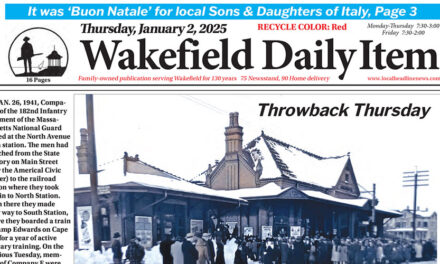WAKEFIELD — Voting in tomorrow’s Town Election takes place at the Galvin Middle School from 7 a.m. to 8 p.m.
One of the contests features a three-way race for two seats on the Town Council. Incumbents Mehreen Butt and Edward Dombroski are being challenged by Christopher Carino.
The Item posed the same question to the three candidates for Town Council: What is your opinion of a new state mandate that will force towns like Wakefield with MBTA service to designate at least one zoning district near the commuter rail station where multi-family housing is allowed by right?
The candidates’ responses follow.
BUTT: The lack of both affordable housing and housing near public transit is a serious problem in the greater Boston area. Wakefield as a town pays thousands of dollars as a commuter rail town. Talking to residents over the last 6 years, I know that MBTA services are an important reason why residents choose to live here. Like many, I chose to move to Wakefield because of the commuter rail, riding it to get to Boston for work and for pleasure like sporting events at the Boston Garden. As a town, we must be thoughtful and deliberate as we try to give more housing choices to people who want to move to (and stay in) Wakefield and take the commuter rail or bus system.
I support the Administration’s decision to ask communities to re-think zoning in districts near commuter rail stations. We as a commuter rail town had conversations with the previous Administration and I look forward to those conversations continuing with the new Administration and the Attorney General’s Office. I look forward to collaborative conversations about how best we can adapt zoning by-laws in our town.

MEHREEN N. BUTT
I am proud that Town Administrator Maio and the Planning Board are taking a thoughtful approach to work on this new law. At a February Town Council meeting that I chaired, we approved the creation of a 40A MBTA Communities Working Group. The group is led by Community Economic Development Director Kokinda and Jim Hogan, Vice Chair of the Planning Board Vice-Chair. Julie Smith-Galvin is the Town Council representative on the Working Group. They are actively meeting, and I look forward to reviewing their findings and recommendations.
CARINO: I disagree with the law and do not think it should be the MBTA’s job to dictate housing policy. I believe zoning should be a local issue. However, the law has been deemed legal so therefore we will need to figure out a compliance plan. I am very concerned for my friends and neighbors living within these potential new housing zones from Greenwood through North Avenue. Overdevelopment, roads and traffic have been fundamental frustrations for Wakefield voters that I have spoken with during this campaign. This law puts additional planning hardships on the Town over and above the hurdles we have already been addressing with 40B.

CHRISTOPHER J. CARINO
DOMBROSKI: There are several reasons why I do not support this new law, Chapter 40A, which is expected to have a detrimental impact on our community. Under Chapter 40A, Wakefield is stripped of much of our local autonomy in making decisions related to housing and zoning. In its place, we are now forced to implement a “one-size-fits-all” state mandate that will significantly impact the composition and character of development going forward and the quality of daily life for our residents.
Years prior to this legislation, Wakefield residents thoughtfully developed and passed our own overlay district at Town Meeting. This area, encompassing the downtown as well as the North Ave. commuter rail station neighborhoods, provides more favorable zoning regulations to encourage smart development that is both transit-centric and focused on economic development in our business districts. This was zoning that was created by our residents, tailored to our community’s unique needs. In the years since, we have begun to see more mixed-used development with commercial/retail on the ground floor and housing above.
This new state mandate now forces Wakefield to separately designate a minimum of one new “district,” of at least 114 acres in size, sitting within a half-mile of a commuter rail station. In other words, options for where this district could be are quite limited. The law also mandates a minimum gross density of 15 housing units per acre. Wakefield is already one of the densest communities in this area in terms of housing. The idea of creating at least 15 housing units on a single acre of land, with a minimum of 114 acres in the new district, is simply too much for our town to accommodate.

EDWARD F. DOMBROSKI
Plus, even though we have seen substantially more new housing production across town in recent years, a significant flaw in this new law is the fact that all housing projects that have already gone through the approval process or have been recently built are not allowed to be counted towards our new mandated housing unit totals. So, that means we will be facing tremendous pressures to cram many more housing units into already overcrowded footprints in our neighborhoods.
To try squeezing too much housing into too small a space, one suggestion is to redevelop single-family homes into three- and four-family properties. Such an overdevelopment of existing properties would fundamentally change the character and feel of many of our neighborhoods and create obvious overcrowding.
I am also concerned about the impact such explosive development growth would have on our town’s infrastructure – from increased school enrollment to greater demands on our police and fire departments to traffic congestion. Notably, this new law is an unfunded mandate, as there is no provision for additional state funding to offset the impact on our town’s services, personnel, or infrastructure.
The latest US Census data shows our population has grown from around 25,000 residents in 2010 to over 27,000 residents as of 2020, even before this new law came into effect. Redeveloping predominantly single-family neighborhoods into denser multi-family dwellings will only further increase population at an unsustainable rate.
And, given that this law allows for aggressive multi-family unit development as of right, many future development projects will not be required to go through the Zoning Board of Appeals (ZBA) process. This means our town’s ability to have any input on future development is either stripped away entirely or significantly diminished, which is very troubling to me.
Further, Chapter 40A prohibits any age restrictions on this new mandated housing. As a result, despite the clear need for more affordable housing options for Wakefield’s senior citizens and Veterans, the law really precludes creating such age-focused development.
To be clear, I fully recognize the need to increase access to an expanded housing inventory. But this new state mandate isn’t the answer. Every community is different in terms of size, population density, layout, and the needs of its residents. Expecting a universal mandate with very specific requirements will best meet the unique needs of every one of the 175 “MBTA Communities” of cities and towns impacted is at best naïve, but more likely simply ill-conceived.
As a commonwealth, we need to address the increasing housing needs in a more thoughtful, customized way. Each city or town needs to have more control in determining what works best for their own community. Forcing a universal mandate on every qualifying community is simply not good policy and will lead to outcomes that compromise the quality of daily life for our residents. This law needs to change.





